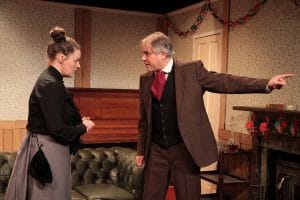- Stars (out of 3)= 2
- One-sentence review= “A socially relevant study of male-female power dynamics”
- Good for people who= enjoyed “The Handmaid’s Tale”
- Not good for people who= like plays with lots of action.
- Would Alan Bennet like it = Yes
During the 2016 Brexit referendum, a couple passed me on their way in to a polling station. “Now, remember which way I told you to vote”, the man said to the woman, who – after a slight hesitation – nodded.
During the 1879 Henrik Ibsen play “A Doll’s House”, a female character remarks of her father’s values, “because he believed these things, I believed them”.
What is a woman defined by – her role as wife/mother/daughter? Or is she defined by herself, her existence as a human being?
This is one of the central questions asked in Progress Theatre’s presentation of the play, directed by Adrian Tang. By resurrecting it for modern audiences, we’re encouraged to ask ourselves how relevant that question remains in the 21stcentury.

It is Christmas; that time of year when families celebrate togetherness, peace, and harmony. Following a long period of financial hardships, an overjoyed Nora (Tara O’Connor) looks forward to leading the celebrations with husband Torvald (Chris Pett) and their two children, following Torvald’s promotion to a prestigious role at a bank.
However…the unexpected arrival of old friend Kristine (Juliana Tiu) triggers a revelation about the lengths to which Nora has gone to bring her family through their recent troubles. Troubles which may not in fact be over when lawyer Krogstad (Paul Gallantry) puts in an appearance and…
…and it’s difficult to say more without spoiling the plot; you’ll have to see it for yourself to find out. But will you find much to engage you if you do?

From Torvald’s first appearance near the very beginning, it quickly becomes apparent that Nora is married to possibly the most patronizing and irritating male character to ever lurch across the stage. A relic of an era when women were regarded as trophies, “little birds” who needed to be told what to think and how to act. Kudos go to Chris Pett for making us hate his character so much that the audience audibly gasp during one moment of misogyny.
We’re compelled to keep watching because we want to understand why Nora believes (as she so often states) that the man loves her, and why she sticks with him – a question brought to the fore during one incredibly beautiful moment between her and the charming Dr Rank (wonderfully played by Mikhail Grozny).
But of course, her plight must’ve been commonplace in an era where women were undoubtedly treated as second-class citizens, and perhaps Nora’s only refuge is self-delusion, with a question mark left hanging over the consequences of trying to act independently. Tara O’Connor does a frankly amazing job of portraying these contradictions, peeling back the layers of the character until we truly understand the challenges faced, both past and present, by women who were and still are forced to live under male oppression.

The journey she takes us on is immeasurably aided by the production’s visuals, which use every little detail to transport us to a late 19thcentury Norwegian house. Credit is due to the director, set designer Peter Cook, costumers Eva van Herel and Rowena Sterry; everything, from the wood paneling to the oil lamp to the antique stove and hand-crafted paper chains, weaves a spell of immersion. Sometimes the most powerful moments are purely visual – the silent spectacle of two children happily playing charades and leaving out a glass of milk for Santa amidst familial discord; the sight of two empty chairs facing each other, their occupants departed.
It’s just a shame that a few glaring oversights shatter this illusion every so often, reminding us that we are watching a play and bringing us back to reality with a bump. An uncomfortably long between-scenes set adjustment is completed by someone in jeans and a t-shirt (which could conceivably have been completed by the Nanny, played ably by Michelle Appleby), while what appears to be a Poundland “flickering flame” electric candle dangles conspicuously from the Christmas Tree. Likewise, Nora and Torvald repeatedly reference a son – who is quite clearly played (very well, I would add) by a girl. A small change to the script could’ve easily disguised what I assume was an inability to find a young male for the part. Unfortunately, moments like these distract from the powerful themes, and reflect an almost workmanlike approach in contrast to the high quality that is otherwise on display.
It’s a pity, as these issues – along with an occasional failure to deliver lines loudly enough to be heard clearly in the back rows, and some occasions where characters suddenly become exceptionally shouty with little build-up or subtlety – seem like avoidable problems that hold a largely good production back from being truly great.

Still, they only ever distract from rather than diminish the play’s themes, and can still be addressed with several days still to go until opening night.
This is definitely recommended, especially to anyone with an interest in gender politics who’s wondering how much things have really changed since the 1800’s. Progress Theatre should be applauded for shining a light on this subject (especially so close to International Women’s Day) – a subject which director Adrian Tang also plans to revisit (in a very different form) in his next production “Tulips”, in May.
“A Doll’s House” is on between the 11th– 16thMarch; tickets are available at https://www.ticketsource.co.uk/whats-on/reading/progress-theatre/a-dolls-house.


















































